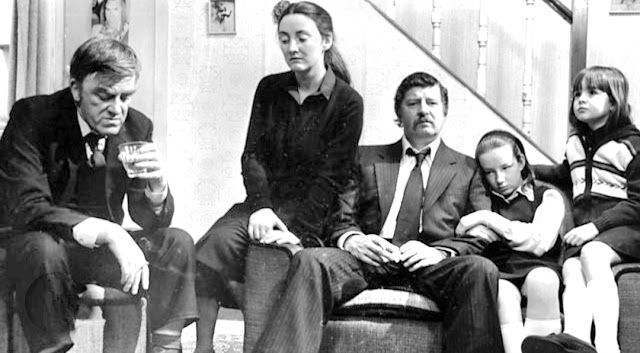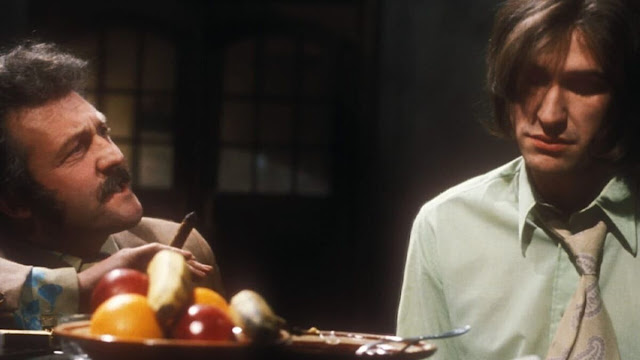About Play for Today Pilgrimage Blog
Zoë: Phil B and I have been friends on Twitter and Facebook for some years - and have even met in actual real life, once. When I noticed that he was Tweeting about watching old episodes of Play for Today, I was immediately interested. I am much older than he is and I remember not only Play for Today on the television, but its predecessor The Wednesday Play (and even The Afternoon Play each weekday afternoon on the radio.)
Although I was too young to understand the plays properly, I liked both The Wednesday Play and Play for Today, when I got a chance to see them. I think I thought they were rather sophisticated, although I don't know what that means really, let alone why it struck me as an attractive quality.
Now I wonder if the plays were a transitional form, made by people who saw television as an extension of theatre, rather than a different thing altogether, cinema on a small screen.
Certainly television has since progressed - or if that is not the right word at least gone on - to become something with little in common with theatre, which I suppose was inevitable. Part of theatre's magic is its ephemerality and uncertainty - no two performances will ever be identical - and that cannot easily be recreated when performances are captured once and forever on film. Theatre's necessary stylisation - no stage can ever be a truly realistic setting; the audience needs always to suspend at least a bit of disbelief as the curtain goes up on a set, (however meticulously it may be put together, there is always a consciousness of the wings to each side) - gives way in television to filming in real rooms and on real streets.
But the attempt to bring plays into television did give audiences an opportunity to experience something that I think is now missing - the oddness and almost deliberate lack of an attempt at verisimilitude or realism that theatrical works to a greater or less extent always contain meant audiences accepted that they had to do some imaginative work and thus in a way be part of the process. Now most drama on television is created in minute visual detail; carefully crafted costumes and apparently real settings are absolutely essential and special effects make almost anything seem genuine, without any effort from the viewer, who expects dazzlingly sharp images that never make him think they come from an imagination, but only from real life.
Phil B: If someone had asked me to describe Play for Today a few months ago, I
would have had to rely on a vague memory of very earnest television
dramas by left-wing playwrights, usually set in the North. My parents
wouldn't let me watch them because they often contained an unholy
trinity of bad language, female nudity and socialist sympathies - all
things that incurred the wrath of that guardian of public decency, Mary
Whitehouse. For me, they became a forbidden fruit.
Today, Play
for Today is often heralded as "groundbreaking" and "revolutionary."
This isn't quite fair, as the series was merely a rebranding of the 1964
series The Wednesday Play, which had already broken the mould with dramas like Cathy Come Home, The War Game and Stand Up, Nigel Barton.
The name change happened for the dullest of reasons: the BBC wanted to
show sport on Wednesday evenings and move its drama slot to Thursday,
but instead of renaming it The Thursday Play, we got the catchier Play for Today.
After watching a few episodes, I've been struck by the sheer variety of themes and settings, from the folk horror of Robin Redbreast to the heartwarming comedy of The Fishing Party. At its best, Play for Today held a mirror up to Britain in the 1970s and early 80s, reflecting its hopes, fears, absurdities and achievements. It also provided opportunities for many writers and actors who are now household names.
The series came to an end in 1984, when the BBC decided to divert Play for Today's budget and resources into making a new soap opera to challenge ITV's dominance of the genre. Swapping quality drama for Eastenders seemed a depressing sign of the times. Fortunately, it turned out that The Wednesday Play was just undergoing a new metamorphosis - this time into a series of filmed dramas called Screen Two.
Like Play for Today, Screen Two
lasted for 14 years, ending its run in 1998, so I think it's fair to
talk about a "golden age" of British drama that spanned over three
decades, from the first Wednesday Play in 1964 to the last Screen Two.
After
discovering a huge archive of television drama on YouTube, I decided
to try and watch every remaining episode of Play for Today (in its
infinite wisdom, the BBC wiped 28 episodes) and was delighted when Zoë suggested a joint enterprise.
I agree with Zoë's point about the transitional nature of the format. For some writers and directors, it was an opportunity to stage a theatrical play that could reach a mass audience, while others were clearly more interested in the medium of film-making. It will be interesting to see which of these dramas still stand up, half a century later.



Comments
Post a Comment